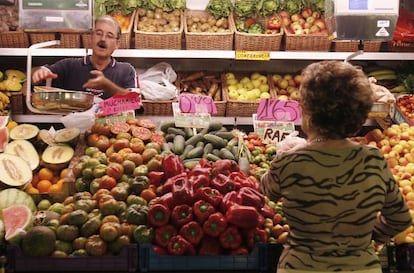Market stalled in Alicante
Local traders are desperate for a more gourmet edge to bring back customers

Shoppers at Alicante's central market are getting old, yet every Saturday around noon, the square at its entrance fills with youngsters making their way to two local bars, thirsty for beers and hungry for tapas. "Let's meet in the market," they say to each other.
But while the market appears to be a popular meeting place for the city's youth, only one in 60 passers-by under 35 actually makes their way inside.
In the last six years, young families have moved away from the city center and are no longer shopping in the markets that their parents' generation once frequented. Alicante stall holders look with envy at the thriving markets in Madrid, Barcelona and Valencia that have redefined themselves as gourmet eating spots without losing their essence.
The problem with Alicante's market is that the municipal government has not allowed these changes, and now stall owners are pleading for the town hall to revise legislation to allow cooking on the site.
Only one in 60 passers-by under 35 makes their way inside the market
A study by the Valencia Chamber of Commerce is urging sellers to push for the changes. The average age of shoppers at the central Alicante market is 60. Young people are ignoring the stalls, even though they sell the highest quality food in the city, according to a study.
"We have to create the tapeta of the market," says José Vicente Valenzuela, a butcher who is also president of the city's Association of Municipal Markets, referring to the spontaneous gatherings of people that have been going on for years in the adjacent square.
These tapas-fueled meetings are a source of income that has been ignored by traders up till now, but it is one looking increasingly attractive in these times of crisis. From Monday to Thursday, the central market is frequented predominantly by housewives - 90 percent of customers are female - retirees and the occasional wandering tourist.
"In the afternoon we are closed, when people who work can shop," complains Valenzuela. "We need to expand hours at least on Fridays... and Saturdays are when the young people come out; when they can shop, have a drink, snack, or eat a meal and socialize inside the market halls. We need to stretch the schedule until at least six on Fridays and Saturdays," he adds.
But simply changing the opening hours is unlikely to resolve all the market's problems. Because many locals are familiar with its bad reputation and short hours, they have lunch elsewhere in jam-packed restaurants and soothe their frayed nerves with gin and tonics when the pubs in the center of town open, before heading off somewhere else for dinner and going back to the pub.
While it is true that the way society is spending money is changing, people are still shelling out large amounts on food and drink. In the center of Alicante alone, the figure averages 66 million euros a year.
And the market stall holders are desperate for a piece of the pie. To get it, they need to be able to merge these new forms of business with their products, introducing wine bars, gastrobars, seafood stands and the like in order to keep up with the trendy gourmet markets in other cities.
"The gourmet is already here," explains Evaristo, a fishmonger, "but a customer needs to be able to eat an oyster, and at the same time, enjoy a good glass of wine."
However, as Valenzuela points out, "the municipal bylaw, unchanged since 1994, does not allow for any of this: nor to changes to the market, nor to allowing cooking."
"We want the market to return to being a meeting point," says Rafael Reus, another fishmonger who has been pushing for greater flexibility in the market since 1985.
He grew up knowing the market as a space with bars inside, and he finds the current situation strange. "There used to be life here," he notes, referring to a vacant space with nothing but windows shaded with blinds. "You have the best fish at the best price and no one comes. This is encouraging everything that's wrong with the modern market," he claims.
In Alicante, 20 stalls have closed, mostly on the ground floor, where traders used to offer some of the best gastronomy in the region. "This is not Madrid, nor does it look like it at all," says another fishmonger eager to reinvent the market's business strategy. "But I would be happy with just a busy weekend; it doesn't have to be full all seven days."
Tu suscripción se está usando en otro dispositivo
¿Quieres añadir otro usuario a tu suscripción?
Si continúas leyendo en este dispositivo, no se podrá leer en el otro.
FlechaTu suscripción se está usando en otro dispositivo y solo puedes acceder a EL PAÍS desde un dispositivo a la vez.
Si quieres compartir tu cuenta, cambia tu suscripción a la modalidad Premium, así podrás añadir otro usuario. Cada uno accederá con su propia cuenta de email, lo que os permitirá personalizar vuestra experiencia en EL PAÍS.
¿Tienes una suscripción de empresa? Accede aquí para contratar más cuentas.
En el caso de no saber quién está usando tu cuenta, te recomendamos cambiar tu contraseña aquí.
Si decides continuar compartiendo tu cuenta, este mensaje se mostrará en tu dispositivo y en el de la otra persona que está usando tu cuenta de forma indefinida, afectando a tu experiencia de lectura. Puedes consultar aquí los términos y condiciones de la suscripción digital.








































